人教版新目标九年级英语初三教学设计Unit 10 You're supposed to shake hands.教案
- 格式:doc
- 大小:120.50 KB
- 文档页数:22
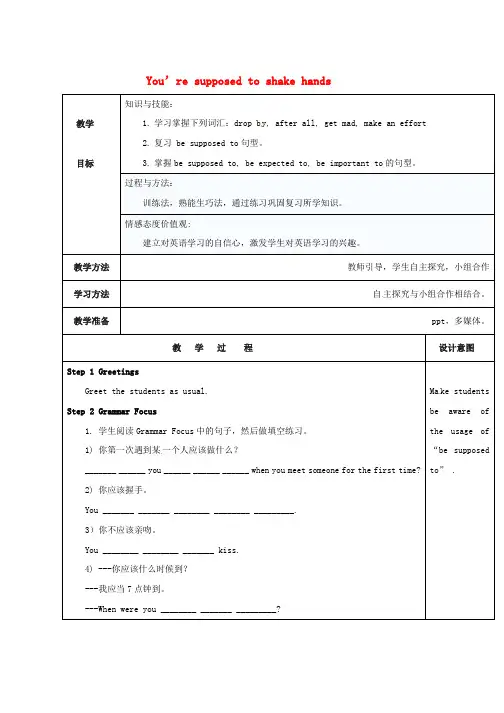
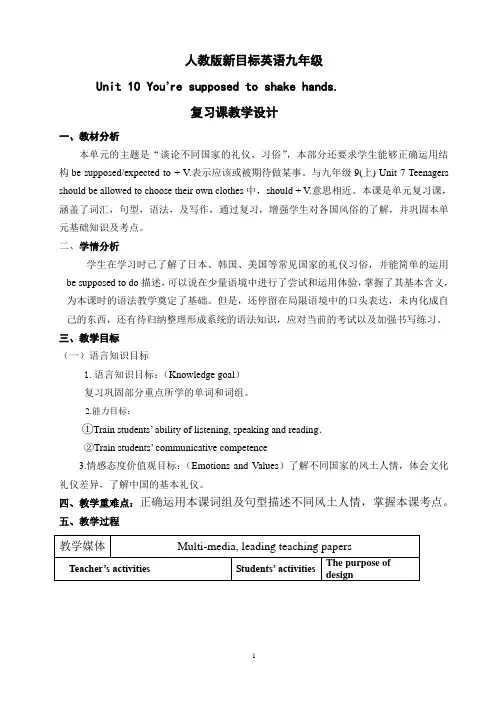
人教版新目标英语九年级Unit 10 You’re supposed to shake hands.复习课教学设计一、教材分析本单元的主题是“谈论不同国家的礼仪,习俗”,本部分还要求学生能够正确运用结构be supposed/expected to + V.表示应该或被期待做某事。
与九年级9(上) Unit 7 Teenagers should be allowed to choose their own clothes中,should + V.意思相近。
本课是单元复习课,涵盖了词汇,句型,语法,及写作,通过复习,增强学生对各国风俗的了解,并巩固本单元基础知识及考点。
二、学情分析学生在学习时已了解了日本、韩国、美国等常见国家的礼仪习俗,并能简单的运用be supposed to do描述,可以说在少量语境中进行了尝试和运用体验,掌握了其基本含义,为本课时的语法教学奠定了基础。
但是,还停留在局限语境中的口头表达,未内化成自己的东西,还有待归纳整理形成系统的语法知识,应对当前的考试以及加强书写练习。
三、教学目标(一)语言知识目标1.语言知识目标:(Knowledge goal)复习巩固部分重点所学的单词和词组。
2.能力目标:①Train students’ ability of listening, speaking and reading.②Train students’ communicative competence3.情感态度价值观目标:(Emotions and Values)了解不同国家的风土人情,体会文化礼仪差异,了解中国的基本礼仪。
四、教学重难点:正确运用本课词组及句型描述不同风土人情,掌握本课考点。
五、教学过程。
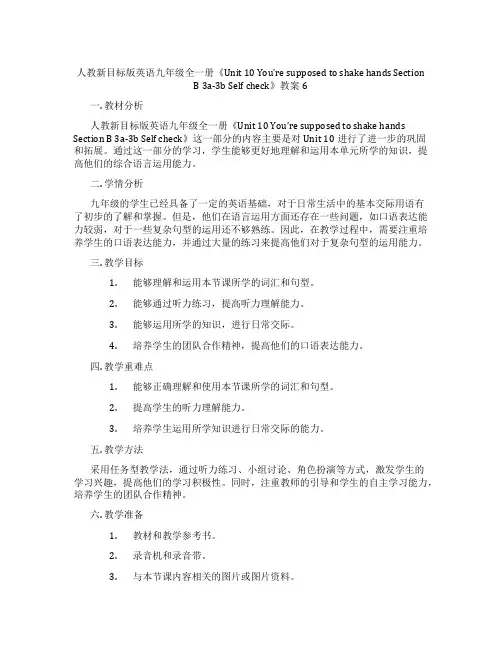
人教新目标版英语九年级全一册《Unit 10 You’re supposed to shake hands SectionB 3a-3b Self check》教案6一. 教材分析人教新目标版英语九年级全一册《Unit 10 You’re supposed to shake hands Section B 3a-3b Self check》这一部分的内容主要是对Unit 10进行了进一步的巩固和拓展。
通过这一部分的学习,学生能够更好地理解和运用本单元所学的知识,提高他们的综合语言运用能力。
二. 学情分析九年级的学生已经具备了一定的英语基础,对于日常生活中的基本交际用语有了初步的了解和掌握。
但是,他们在语言运用方面还存在一些问题,如口语表达能力较弱,对于一些复杂句型的运用还不够熟练。
因此,在教学过程中,需要注重培养学生的口语表达能力,并通过大量的练习来提高他们对于复杂句型的运用能力。
三. 教学目标1.能够理解和运用本节课所学的词汇和句型。
2.能够通过听力练习,提高听力理解能力。
3.能够运用所学的知识,进行日常交际。
4.培养学生的团队合作精神,提高他们的口语表达能力。
四. 教学重难点1.能够正确理解和使用本节课所学的词汇和句型。
2.提高学生的听力理解能力。
3.培养学生运用所学知识进行日常交际的能力。
五. 教学方法采用任务型教学法,通过听力练习、小组讨论、角色扮演等方式,激发学生的学习兴趣,提高他们的学习积极性。
同时,注重教师的引导和学生的自主学习能力,培养学生的团队合作精神。
六. 教学准备1.教材和教学参考书。
2.录音机和录音带。
3.与本节课内容相关的图片或图片资料。
4.教学PPT。
七. 教学过程1.导入(5分钟)通过复习上一节课的内容,引导学生进入本节课的学习。
2.呈现(10分钟)教师通过图片或图片资料,呈现本节课的主要内容,引导学生进行观察和思考。
3.操练(15分钟)学生听录音,并根据所听到的内容,完成相关的练习。
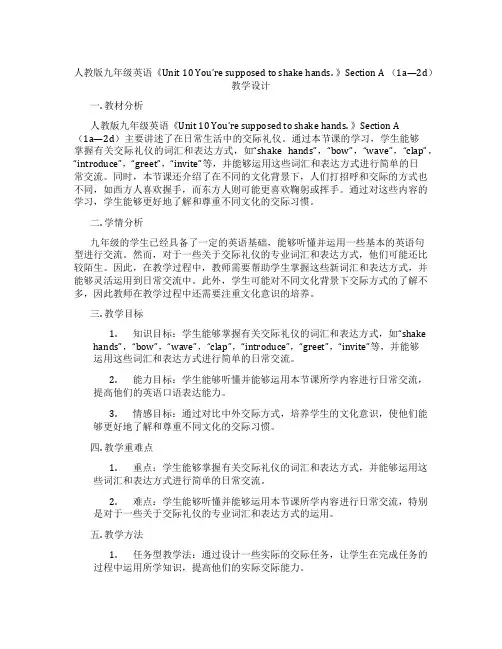
人教版九年级英语《Unit 10 You’re supposed to shake hands. 》Section A (1a—2d)教学设计一. 教材分析人教版九年级英语《Unit 10 You’re supposed to shake hands. 》Section A(1a—2d)主要讲述了在日常生活中的交际礼仪。
通过本节课的学习,学生能够掌握有关交际礼仪的词汇和表达方式,如“shake hands”,“bow”,“wave”,“clap”,“introduce”,“greet”,“invite”等,并能够运用这些词汇和表达方式进行简单的日常交流。
同时,本节课还介绍了在不同的文化背景下,人们打招呼和交际的方式也不同,如西方人喜欢握手,而东方人则可能更喜欢鞠躬或挥手。
通过对这些内容的学习,学生能够更好地了解和尊重不同文化的交际习惯。
二. 学情分析九年级的学生已经具备了一定的英语基础,能够听懂并运用一些基本的英语句型进行交流。
然而,对于一些关于交际礼仪的专业词汇和表达方式,他们可能还比较陌生。
因此,在教学过程中,教师需要帮助学生掌握这些新词汇和表达方式,并能够灵活运用到日常交流中。
此外,学生可能对不同文化背景下交际方式的了解不多,因此教师在教学过程中还需要注重文化意识的培养。
三. 教学目标1.知识目标:学生能够掌握有关交际礼仪的词汇和表达方式,如“shakehands”,“bow”,“wave”,“clap”,“introduce”,“greet”,“invite”等,并能够运用这些词汇和表达方式进行简单的日常交流。
2.能力目标:学生能够听懂并能够运用本节课所学内容进行日常交流,提高他们的英语口语表达能力。
3.情感目标:通过对比中外交际方式,培养学生的文化意识,使他们能够更好地了解和尊重不同文化的交际习惯。
四. 教学重难点1.重点:学生能够掌握有关交际礼仪的词汇和表达方式,并能够运用这些词汇和表达方式进行简单的日常交流。
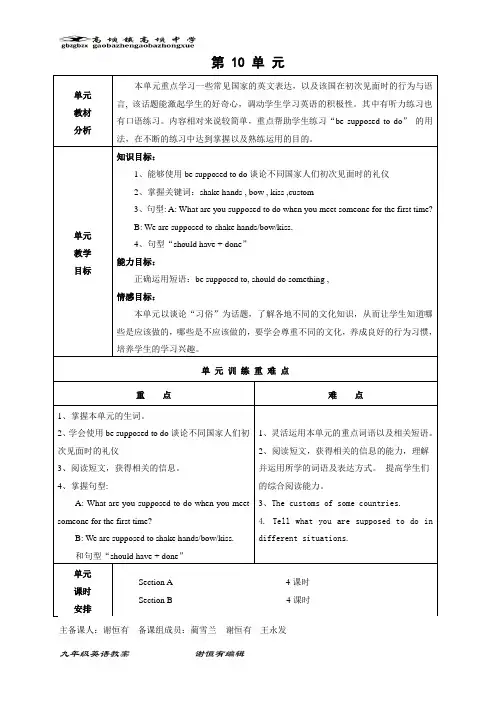
第 10 单元单元教材分析本单元重点学习一些常见国家的英文表达,以及该国在初次见面时的行为与语言, 该话题能激起学生的好奇心,调动学生学习英语的积极性。
其中有听力练习也有口语练习。
内容相对来说较简单,重点帮助学生练习“be supposed to do”的用法,在不断的练习中达到掌握以及熟练运用的目的。
单元教学目标知识目标:1、能够使用be supposed to do谈论不同国家人们初次见面时的礼仪2、掌握关键词:shake hands , bow , kiss ,custom3、句型: A: What are you supposed to do when you meet someone for the first time?B: We are supposed to shake hands/bow/kiss.4、句型“should have + done”能力目标:正确运用短语:be supposed to, should do something ,情感目标:本单元以谈论“习俗”为话题,了解各地不同的文化知识,从而让学生知道哪些是应该做的,哪些是不应该做的,要学会尊重不同的文化,养成良好的行为习惯,培养学生的学习兴趣。
单元训练重难点重点难点1、掌握本单元的生词。
2、学会使用be supposed to do谈论不同国家人们初次见面时的礼仪3、阅读短文,获得相关的信息。
4、掌握句型:A: What are you supposed to do when you meet someone for the first time?B: We are supposed to shake hands/bow/kiss.和句型“should have + done”1、灵活运用本单元的重点词语以及相关短语。
2、阅读短文,获得相关的信息的能力,理解并运用所学的词语及表达方式。
提高学生们的综合阅读能力。
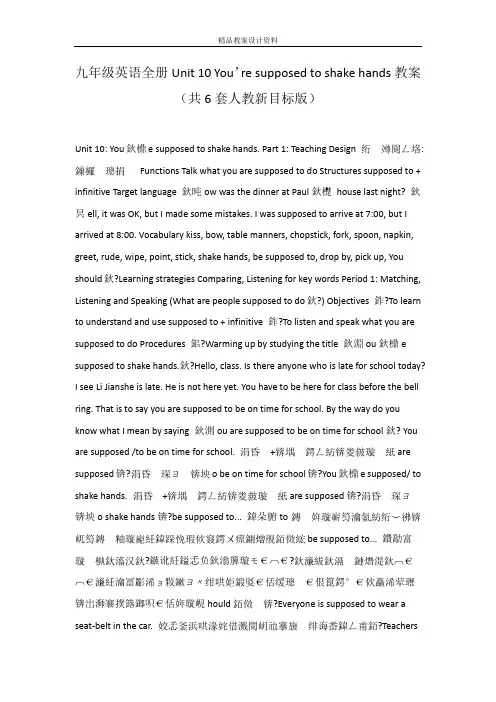
九年级英语全册Unit 10 You’re supposed to shake hands教案(共6套人教新目标版)Unit 10: You鈥檙e supposed to shake hands. Part 1: Teaching Design : Functions Talk what you are supposed to do Structures supposed to + infinitive Target language 鈥旽ow was the dinner at Paul鈥檚house last night? 鈥昗ell, it was OK, but I made some mistakes. I was supposed to arrive at 7:00, but I arrived at 8:00. Vocabulary kiss, bow, table manners, chopstick, fork, spoon, napkin, greet, rude, wipe, point, stick, shake hands, be supposed to, drop by, pick up, You should鈥?Learning strategies Comparing, Listening for key words Period 1: Matching, Listening and Speaking (What are people supposed to do鈥?) Objectives 鈼?To learn to understand and use supposed to + infinitive 鈼?To listen and speak what you are supposed to do Procedures 鈻?Warming up by studying the title 鈥淵ou鈥檙e supposed to shake hands.鈥?Hello, class. Is there anyone who is late for school today?I see Li Jianshe is late. He is not here yet. You have to be here for class before the bell ring. That is to say you are supposed to be on time for school. By the way do you know what I mean by saying 鈥測ou are supposed to be on time for school鈥? You are supposed /to be on time for school. +are supposed锛?o be on time for school锛?You鈥檙e supposed/ to shake hands. +are supposed锛?锛坱o shake hands锛?be supposed to... 鍏朵腑tobe supposed to... 鐨勪富?鏃讹紝鎰忎负鈥滃簲璇モ€︹€?锛岀浉褰撲簬鎯呮€佸姩璇峴hould?Everyone is supposed to wear a seat-belt in the car. ?Teachersare supposed to treat all the students alike.€瑙嗗悓浠併€?1a Looking and matching Hello, class. What are we supposed to do next? Yes, you are right. We are going to look, listen and match. Now turn to page 94. Look at the picture and listen to the recording for what people do when they meet for the first time. 1b Listening and checking You are supposed to listen for a second time to check your answers in 1a. Countries Customs 1. c Brazil a. bow b. shake hands c. kiss 2. b the United States 3. a Japan 4. b Mexico 5. a Korea Now go to page135 to read this conversation. While reading try to find all the sentences with the 鈥渟upposed to + infinitive structure鈥? And also cut/ the sentence into thought groups, study all the predicates, circle all the linking words and underline all the expressions. That鈥檚grammar study, too. Sentences with the 鈥渟upposed to + infinitive structure鈥?What are people supposed to do when they meet in your country? Useful expressions from the text be supposed to do 鈥? meet in a country, meet for the first time, shake hands, in most Western countries Now read the conversation again to turn it into an article. 1c Pairing and speaking What do people do when they meet for the first time? Now in pairs tell each other what you know about meeting for the first time. You are supposed to use 鈥渢he supposed to锛?infinitive structure鈥? OK? A: What are people in Korea supposed to do when they meet for the first time? B: They鈥檙e supposed to bow. A: What are people in the United States supposed to do when they meet for the first time? B: They鈥檙e supposed to shake hands. A: What are people in China supposed to do when they meet for the first time? B: They鈥檙e supposed to shake hands. A: What are people in Mexico supposed to do when they meet for the first time? B: They鈥檙e supposed to shake hands. A: What are people in Brazil supposed to do when they meet for the first time? B: They鈥檙e supposed to kiss. A: What are people in your city supposed to do when they meet for the first time? B: They鈥檙e supposed to wave their hands.。
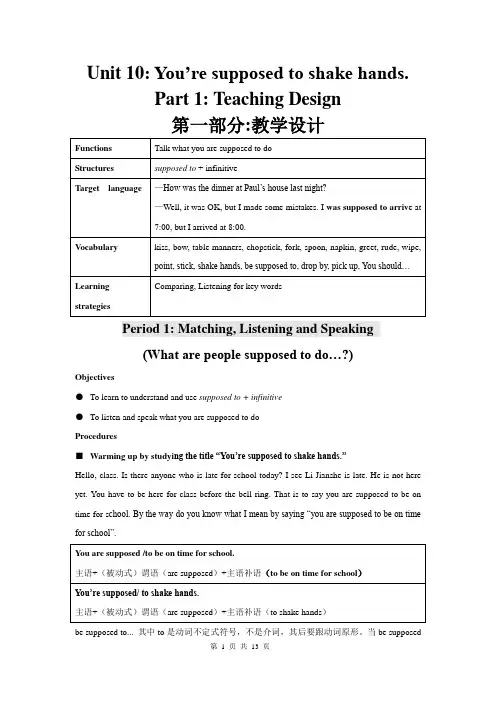
Unit 10: You’re supposed to shake hands.Part 1: Teaching Design第一部分:教学设计Period 1: Matching, Listening and Speaking(What are people supposed to do…?)Objectives●To learn to understand and use supposed to + infinitive●To listen and speak what you are supposed to doProcedures■Warming up by studyi ng the title “You’re supposed to shake hands.”Hello, class. Is there anyone who is late for school today? I see Li Jianshe is late. He is not here yet. You have to be here for class before the bell ring. That is to say you are supposed to be on time for s chool. By the way do you know what I mean by saying “you are supposed to be on time for school”.be supposed to... 其中to是动词不定式符号,不是介词,其后要跟动词原形。
当be supposedto... 的主语是“人”时,意为“应该……”;“被期望……”,它可以用来表示劝告、建议、义务、责任等,相当于情态动词should。
如:Everyone is supposed to wear a seat-belt in the car. 每个人在汽车里都应该系安全带。
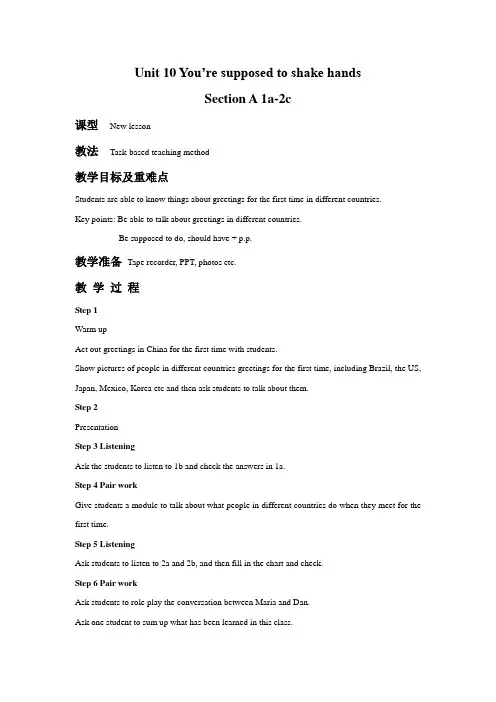
Unit 10 You’re supposed to shake handsSection A 1a-2c课型New lesson教法Task-based teaching method教学目标及重难点Students are able to know things about greetings for the first time in different countries.Key points: Be able to talk about greetings in different countries.Be supposed to do, should have + p.p.教学准备Tape recorder, PPT, photos etc.教学过程Step 1Warm upAct out greetings in China for the first time with students.Show pictures of people in different countries greetings for the first time, including Brazil, the US, Japan, Mexico, Korea etc and then ask students to talk about them.Step 2PresentationStep 3 ListeningAsk the students to listen to 1b and check the answers in 1a.Step 4 Pair workGive students a module to talk about what people in different countries do when they meet for the first time.Step 5 ListeningAsk students to listen to 2a and 2b, and then fill in the chart and check.Step 6 Pair workAsk students to role play the conversation between Maria and Dan.Ask one student to sum up what has been learned in this class.Step 7 SummaryStep 8 CheckCheck if the students understand what has been learned.Step 9HomeworkAsk students to write greetings in different countries.Write a short passage about greetings in different countries.Do exercises in class:Translation:1中国人第一次见面的时候应该怎样做?(按实际回答)2你迟到了,你本应该早五分钟来。
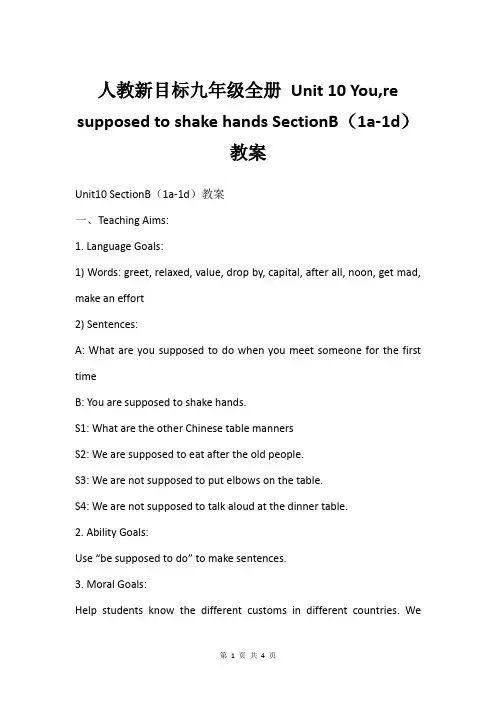
人教新目标九年级全册Unit 10 You,re supposed to shake hands SectionB(1a-1d)教案Unit10 SectionB(1a-1d)教案一、Teaching Aims:1. Language Goals:1) Words: greet, relaxed, value, drop by, capital, after all, noon, get mad, make an effort2) Sentences:A: What are you supposed to do when you meet someone for the first timeB: You are supposed to shake hands.S1: What are the other Chinese table mannersS2: We are supposed to eat after the old people.S3: We are not supposed to put elbows on the table.S4: We are not supposed to talk aloud at the dinner table.2. Ability Goals:Use “be supposed to do” to make sentences.3. Moral Goals:Help students know the different customs in different countries. Weshould know when in Rome, do as the Romans do.二、Teaching important Listening, speaking, reading, writing methods.五、Teaching ProceduresⅠ. Lead-in1. Watch a short movieT: Hello, everyone! We know different countries have different customs. But how do we display impeccable manners Let’s see a movie about how to behave good manners. How do you feel after watching the movie 2. After watching movie, Ss try to answer the questions.Ⅰ. Presentation1. See teaching objectsTo learn the table manners around the world.To read, listen and speak how you are supposed to behave at dinner tables in China.2. Students look at pictures and say different customs in different countries by using “be supposed to do” to make sentences.3. Ask students to turn to P77 to finish 1a and check the answers.4. Ask students about Chinese table manners:After seeing the pictures and say Chinese table manners.Summarize Chinese table manners.Ⅰ. Listening1. T: Steve is going to China to study. His friend Yang Ming is telling himabout table manners in China. Now listen and number the pictures in the order you hear them.2. Play the recording twice. Students number the pictures and match sentences parts.3. Play the recording again. Check the answers with the Ss.Ⅰ. Group workAsk student to make conversations.E.g.S1: What are the other Chinese table mannersS2: We are supposed to eat after the old people.S3: We are not supposed to put elbows on the table.S4: We are not supposed to talk aloud at the dinner table.Give students two minutes to make their conversations and perform their conversations.Ⅰ. Writing1. Ask students to summarize the phrases about Chinese table manners.2. Let some Ss read the information about writing and ask them to use sentence.3. Ss try to write a composition about Chinese table manners by using information in the chart. (Give students five minutes to write their compositions)4. Invite some students to read their compositions and check if there aremistakes.Ⅰ. SummaryAsk students to summarize the key phrases.Ⅰ. Homework:1. Find the differences about the table manners between France and China.2. Write a composition about Chinese table manners.。
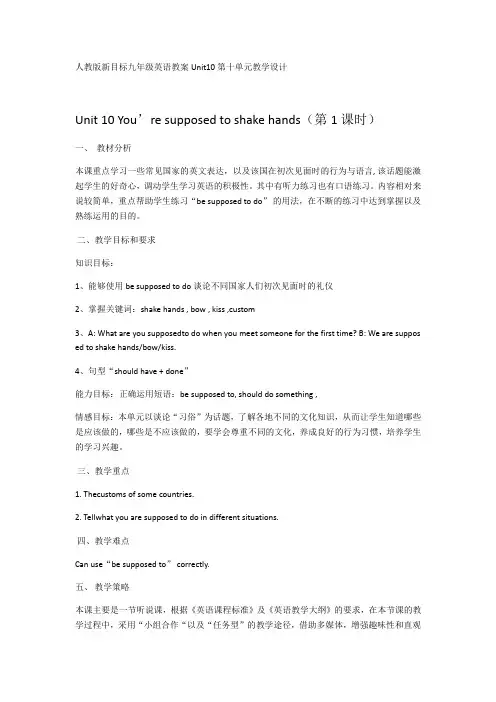
人教版新目标九年级英语教案Unit10第十单元教学设计Unit10You’re supposed to shake hands(第1课时)一、教材分析本课重点学习一些常见国家的英文表达,以及该国在初次见面时的行为与语言,该话题能激起学生的好奇心,调动学生学习英语的积极性。
其中有听力练习也有口语练习。
内容相对来说较简单,重点帮助学生练习“be supposed to do”的用法,在不断的练习中达到掌握以及熟练运用的目的。
二、教学目标和要求知识目标:1、能够使用be supposed to do谈论不同国家人们初次见面时的礼仪2、掌握关键词:shake hands,bow,kiss,custom3、A:What are you supposedto do when you meet someone for the first time?B:We are suppos ed to shake hands/bow/kiss.4、句型“should have+done”能力目标:正确运用短语:be supposed to,should do something,情感目标:本单元以谈论“习俗”为话题,了解各地不同的文化知识,从而让学生知道哪些是应该做的,哪些是不应该做的,要学会尊重不同的文化,养成良好的行为习惯,培养学生的学习兴趣。
三、教学重点1.Thecustoms of some countries.2.Tellwhat you are supposed to do in different situations.四、教学难点Can use“be supposed to”correctly.五、教学策略本课主要是一节听说课,根据《英语课程标准》及《英语教学大纲》的要求,在本节课的教学过程中,采用“小组合作“以及“任务型”的教学途径,借助多媒体,增强趣味性和直观性,增大课堂容量,提高课堂效率,面向全体同学,在听说过程中帮助学生掌握知识、发展能力、形成正确的价值观。
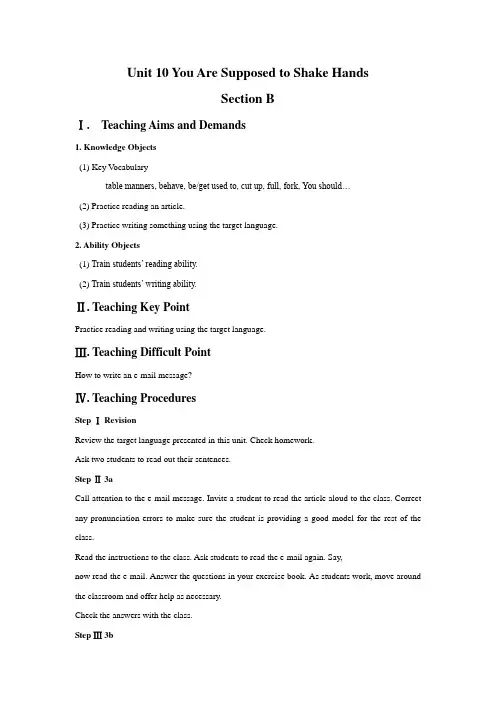
Unit 10 You Are Supposed to Shake HandsSection BⅠ.Teaching Aims and Demands1. Knowledge Objects(1) Key Vocabularytable manners, behave, be/get used to, cut up, full, fork, You should…(2) Practice reading an article.(3) Practice writing something using the target language.2. Ability Objects(1) Train students’ reading ability.(2) Train students’ writing ability.Ⅱ. Teaching Key PointPractice reading and writing using the target language.Ⅲ. Teaching Difficult PointHow to write an e-mail message?Ⅳ. Teaching ProceduresStep Ⅰ RevisionReview the target language presented in this unit. Check homework.Ask two students to read out their sentences.Step Ⅱ 3aCall attention to the e-mail message. Invite a student to read the article aloud to the class. Correct any pronunciation errors to make sure the student is providing a good model for the rest of the class.Read the instructions to the class. Ask students to read the e-mail again. Say,now read the e-mail. Answer the questions in your exercise book. As students work, move around the classroom and offer help as necessary.Check the answers with the class.Step Ⅲ 3bRead the instructions to the class. Point to the beginning of the e-mail message.Read it to the class.Here are some things you need to know about table manners when you visit Japan. First of all, you should…Look back at the pictures in Activity 2a and the matching exercise in Activity 2b.You can use the pictures and information in Activities 2a and 2b to help you write your letters. Ask students to finish the activity on their own. As they work, walk around the classroom offering help and answering questions as needed.Check the answers with the class. Ask a student to read his completed article to the class.Step Ⅳ3cRead the instructions and ask students to look back at Activity 2c.Remind students that they made conversations about table manners in their own country.Say. You can use the ideas you talked about in Activity 2c as you write your email messages.Get students to finish the activity on their own. As students work, move around the room offering help as needed.Ask a student to read his or her message to the class. Have other students add any information that is missing from the first student’s report.Step Ⅵ Homework1. Read the e-mail message in Activity 3a again.2. Write an e-mail message to a friend about table manners.。
人教新目标版英语九年级全一册《Unit 10 You’re supposed to shake hands SectionB 3a-3b Self check》教学设计8一. 教材分析本课选自人教新目标版英语九年级全一册《Unit 10 You’re supposed to shake hands Section B 3a-3b Self check》。
本节课主要讲述了在不同的文化背景下,人们打招呼的方式不同。
本部分通过一个调查问卷的形式,让学生了解并比较不同国家的问候方式,培养学生的跨文化交际意识。
二. 学情分析九年级的学生已经掌握了基本的英语语法和词汇,具备一定的听说读写能力。
但是,对于一些特殊的交际场景和文化差异可能还不够了解。
因此,在教学过程中,教师需要帮助学生理解和掌握相关词汇和句型,并引导他们了解和尊重不同的文化背景。
三. 教学目标1.知识目标:学生能够掌握本课中的相关词汇和句型,并能够运用它们进行简单的交流。
2.能力目标:学生能够通过阅读和听力,理解不同文化背景下的问候方式,并能够进行相应的交流。
3.情感目标:学生能够尊重并理解不同的文化,培养跨文化交际的意识。
四. 教学重难点1.重点:学生能够掌握本课中的相关词汇和句型,并能够运用它们进行简单的交流。
2.难点:学生能够理解不同文化背景下的问候方式,并能够进行相应的交流。
五. 教学方法1.任务型教学法:通过设计各种任务,让学生在实践中学习和运用语言。
2.交际法:通过模拟真实的交际场景,让学生在交流中学习和提高。
3.文化导入法:通过介绍不同的文化背景,让学生了解和尊重不同的文化。
六. 教学准备1.教师准备:准备好相关的教学材料和课件,熟悉教材内容。
2.学生准备:学生预习本节课的内容,了解相关的词汇和句型。
七. 教学过程1.导入(5分钟)教师通过展示不同国家的问候方式的视频,引导学生谈论不同文化背景下的问候方式。
2.呈现(10分钟)教师呈现3a部分的调查问卷,让学生独立完成,并回答相关问题。
人教新目标英语九年级上册-Unit10YouaresupposedtoshakehandsSectionA1(1a-2d)教课设计课题教师学习目标Unit10You’resupposedtoshakehands.课SectionA1(1a-2d)听闻课型所在单位年级九年级知识目标:1)能掌握以下单词:custom, bow,kiss, greet,besupposedto,2)掌握besupposedto句型的用法。
能力目标:能听懂书中短文并能用besupposedto说一些平时社交用语。
感情态度:1).学习一些会面礼仪,生活风俗和对时间的见解。
2).认识西方国家的风土人情和风俗。
学习重难点教课环节[根源:]StepOne教课要点:besupposedto的用法教课难点:中西方人们会面礼仪的差异。
[根源:Z|xx|]培育学生跨文化社交意识。
教师活动学生活动I.情形导学,示范听闻学生写单词,词组。
和教师一1.听写单词,词组。
起读出来。
为本课的学习做2.师:学生在学校应当做哪些事准备。
情?引出新句型。
如:Isitagoodideatocometoclas slate?No.That’sright.It’snotagood 生回答下列问题。
’renot supp osedtocometocla sslate.You’resupposedto dohomeworkeveryday,raise yourhandbefore1/3Unit10Youaresupposedtoshakehan dsSectionA1(1a-2d)教课设计大屏幕展现各个国家国旗,师生学生认识国旗,进入custom 的话题。
Doyouknowwhatpeopledowhen[根源:学|科|网]多媒体体现1a 图片,让学生根学生依据图画内容,谈谈图中的握手,接吻,鞠躬是哪个国家的礼仪,而后按要求把书本给出的“国家”和“风俗”连结起来。
Unit 10 You’re supposed to shake hands.Section A 1 (1a-2d)一、教学目标:1. 语言知识目标:1) 能掌握以下单词:custom, bow, kiss, greet, be supposed to,2)掌握be supposed to句型的用法。
2. 情感态度价值观目标:1. 学习一些见面礼仪,生活习俗和对时间的看法。
2. 了解西方国家的风土人情和习俗。
二、教学重难点1. 教学重点:be supposed to的用法2. 教学难点:中西方人们见面礼仪的差别。
培养学生跨文化交际意识。
三、教学过程I. Lead-in师生讨论:学生在学校应该做哪些事情?引出新句型。
如:Is it a good idea to come to class late?S: No.T: That’s right. It’s not a good idea to come late. You’re not supposed to come to class late. You’re supposed to …eat in class, do homework every day, raise your hand before talking等做更多的练习,引出be supposed to句型II. Discussion1. 大屏幕展示一张世界地图,师生对话:T: Do you know where Brazil/ the United States/ Japan/Mexico/Korea is?S:…T: Do you know what people do when they meet for the first time?S: …2. 利用多媒体播放各国初次见面的礼仪,学习新单词:custom, bow, kiss, greet,III. Work on 1a-1c1.1a多媒体呈现1a图片,让学生根据图画内容,说说图中的握手,接吻,鞠躬是哪个国家的礼仪,然后按要求把书本给出的“国家”和“习俗”连接起来。
老师不要给出答案。
2. Listening 1b.Listen to the recording and check your answers to activities in 1a.3. Pair work:A: What are people in Korea/… to do when they meet for the first time?B: They are supposed to bow. How about in the United States?A: They’re supposed to shake hands.4. 教师介绍本单元的目标语言:You’re supposed to ….Ⅳ. Listening1. Listening to 2a and 2b. What mistakes did Maria make?2. Finish 2a and 2b.3.Pair workRole-play a conversation between Maria and Dan.Dan: How was the dinner at Paul’s house last night?Maria: Well, it was OK, but I made some mistakes. I was supposed to arrive at 7:00, but I…V. Role playWork on 2d Role play a conversation between Katie and John. Discuss different customs in different countries.VI. Consolidation完成任务:礼仪大荟萃让学生展示上课前通过网络或书籍等形式查找到的各国礼仪,并分类记录,制成表格。
VII. Language points进一步向学生讲解本单元的目标语言: be supposed to, be expected to.1. You are supposed to shake hands.be supposed to do… 应该……被期望做……,当句子的主语是人时,它可以用来表示劝告,建议,义务,责任等,意思是“to be expected to do sth., or to have to do sth.”e.g. You’re supposed to ask the teacher if you want to leave the classroom.如果你要离开教室,应该先问问老师。
We are not to supposed to play football on Sunday.不准我们在星期日踢足球。
2. That’s how people in Japan are expected to greet each other.greet =to welcome or say “hello” 动词“问候,打招呼”e.g. He greeted her by saying “good morning”.他向她打招呼说“早上好”。
She greeted me with a friendly smile. 她向我微笑致意。
VIII. HomeworkWrite a passage about different customs in different countries.Section A 2 (3a-3c)一、教学目标:1. 语言知识目标:1) 学习掌握下列词汇:relaxed, value, capital, noon, mad, effort, drop by, after all,get mad, make an effort2)复习be supposed to句型。
3)如何正确的阅读课文。
2. 情感态度价值观目标:1)通过“应该” 与“不应该”进一步了解一些国家的礼仪和对时间的看法。
2)了解不同国家的不同的时间观念,加强对中国文化的理解。
二、教学重难点1. 教学重点:1) 掌握本部分出现的生词和词组,达到熟练运用的目标。
2) 阅读短文,获得相关的信息。
通过阅读练习,来提高阅读能力。
2. 教学难点:1) 阅读短文,获得相关的信息的能力。
2) 理解并运用所学的词汇及表达方式。
三、教学过程Ⅰ. Warming up1. 师生问候。
2. 让学生展示上节课的演讲稿:各国礼仪的差异Ⅱ. Lead-in1. 展示一个哥伦比亚和瑞士风光的照片。
使学生熟悉这两个国家的情况,通过图片欣赏引出本节内容。
2. Look at the pictures and say something about the two countries.What do you know about Switzerland?What do you know about Colombia?Ⅲ. Reading1. Work on 3a: Tell Ss to read the article and answer the question:In which country is it OK to be 15 minutes late for dinner?Ss read the article quickly and try to find the answer to the question.2. 方法指导:首先,对原文材料迅速浏览,掌握全文的主旨大意。
速读全文,抓住中心主旨很有必要,在速读的过程中,应尽可能多地捕获信息材料。
其次,带着问题,再回到原文中去寻找、捕获有关信息。
做好这类题的要领是:1).明确题意,顺藤摸瓜。
2).按照要求,寻找答案来源。
3).找准关键词,明白其暗示作用。
4)再读课文,看答案是否符合题意。
3. 按指导的方法带着问题进行阅读。
4. 最后,教师让部分学生说出自己的答案,并校对答案。
Key: In Colombia.Ⅳ. Careful Reading1. Answer the questions according to the passages in 3a.1. Is it OK if people in Colombia arrive a bit late for a friend’s dinner?2. Who are pretty relaxed about time, Colombians or Swiss people?3. Colombians usually make plans to meet friends, don’t they?4. What are you supposed to do if you want to visit your friends in Switzerland?5. What do people in Switzerland think of time?2. Work on 3b. Read the passage again and fill in the chart.V. Role-play 3cRole-play a conversation between Teresa and Marc. Teresa is late and Marc is mad. 注意使用目标语言:In …, you’re supposed to…A: Hi, Marc. Sorry, I’m a little late.B: Teresa, you’re 10 minutes late!A: It’s just 10 minutes! It’s no big deal!B: Well, in Switzerland, you’re supposed to…VI. TalkingSay something about customs in Colombia and Switzerland about being on time and visiting friends.VII. Language points1. Where I’m from, we are pretty relaxed about time.Where I’m from是一个由“where” 引导的地点状语从句。
e.g. Just stay where you are. 就留在你原来的地方。
relaxed adj.放松的,自在的be relaxed about…对…感到放松e.g. Don’t be afraid, just be relaxed about the interview. 不要害怕,轻松面试。